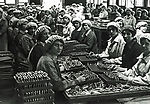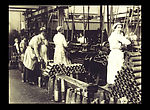In 1914, unemployment amongst women was already high. It was made worse by the thousands who lost their jobs at the beginning of the war. Queen Mary set up a fund to help provide them with work. Mary Macarthur became its secretary. It was at this time that she established a close working relationship with the Queen. Mary Macarthur continued her work with the Women's Trade Union League and the National Federation of Women Workers, and was the only woman to serve on the Emergency Workers National Committee. All of her efforts were directed at protecting the pay and conditions of women. More and more, as the war progressed, they replaced the men that went to war.
At the beginning of the war, appeals were made to women to come forward and release men for military service. Many did, but they were faced with prejudice. You can see from the newspaper cuttings that many employers refused to take them.
In May 1915, news that the troops were short of high explosives shocked the country. A Ministry of Munitions was set up, headed by Lloyd George. They needed to step up production, and so employment of women was positively encouraged. When compulsory male conscription was introduced, all barriers to employing women in men's jobs were swept aside.
The Government did not lay down any rules on pay, and employers were free to set very low rates. The largest number of women were employed in the munitions factories, where the work was extremely hazardous. The munitions girls suffered Lydite poisoning, for which there was no treatment. Their faces and hands turned yellow through handling TNT. They became known as "canaries".
Under the Munitions Act, workers were not allowed to leave their jobs, no matter what the conditions or pay. If they tried to leave without a Certificate of Discharge from the employer, they could be called to a Tribunal and punished. Mary used this, and the fact that Lloyd George had promised to get rid of "sweating" on war work, to her own advantage. She put this single point to Lloyd George, over and over again; if women were not allowed to leave their employment, then the Government was obliged to give them decent conditions and pay.
There was no way round it, she stuck to this point with bulldog tenacity. "In articles, in interviews, in conference, on deputations, she drove it home, in its deadly simplicity. She refused to allow herself to be drawn off into side issues or to allow him to escape on to them." (Hamilton, 1925)
Women's pay and conditions did improve during the war, thanks to Mary and people like her, although equal pay for equal work was never achieved.
Rollover the captions in the box to see the available images in thumbnail format, click the caption to see the full-size image
| Reference: | 712 |
| Keywords: | |
| Archive Ref: | |
| Updated: | Wed 11 Jul 2007 - 1 |
| Interpretation written by | Barbara Harris |
| Author's organisation | |
| Organisation's website |


